|
|
|
Sort Order |
|
|
|
Items / Page
|
|
|
|
|
|
|
| Srl | Item |
| 1 |
ID:
120136
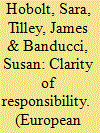

|
|
|
|
|
| Publication |
2013.
|
| Summary/Abstract |
Recent literature has shown that the long established link between economic performance and electoral outcomes is conditioned by a country's institutions and government, what is often termed 'clarity of responsibility'. In this article two distinct dimensions of the clarity of the political context are identified: institutional and government clarity. The first captures the formal dispersion of government power, both horizontally and vertically. The second captures the cohesion of the incumbent government. Analysing survey data from 27 European countries, it is shown that voters' ability to hold governments to account, for both the economy and management of public services, is primarily influenced by the extent to which there is an identifiable and cohesive incumbent, whereas formal institutional rules have no direct impact on performance voting.
|
|
|
|
|
|
|
|
|
|
|
|
|
|
|
|
| 2 |
ID:
156703


|
|
|
|
|
| Summary/Abstract |
To paint a fuller picture of economic voters, we combine personal income records with a representative election survey. We examine three central topics in the economic voting literature: pocketbook versus sociotropic voting, the effects of partisanship on economic evaluations, and voter myopia. First, we show that voters who appear in survey data to be voting based on the national economy are, in fact, voting equally on the basis of their personal financial conditions. Second, there is strong evidence of both partisan bias and economic information in economic evaluations, but personal economic data is required to separate the two. Third, although in experiments and aggregate historical data recent economic conditions appear to drive vote choice, we find no evidence of myopia when we examine actual personal economic data.
|
|
|
|
|
|
|
|
|
|
|
|
|
|
|
|
| 3 |
ID:
167849
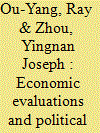

|
|
|
|
|
| Summary/Abstract |
The economic voting literature argues that economics matters to democratic leaders. We argue that it matters to authoritarian leaders, too, and its influence is stronger there than it is in democratic countries. Using data on four Asian countries from the Asian Barometer Survey, we find substantial support for our theory.
|
|
|
|
|
|
|
|
|
|
|
|
|
|
|
|
| 4 |
ID:
095558
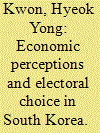

|
|
|
|
|
| Publication |
2010.
|
| Summary/Abstract |
While the notion that subjective economic perceptions as well as objective economic conditions affect electoral outcomes has long been explored in advanced democracies and new democracies, evidence of the link between the economy and elections has been rarely found in East Asian countries. As economic issues have become salient since the 1997 financial crisis, political leaders' capacity to manage the economy has become one of the most important criteria in electoral choice in East Asia. This paper examines how economic issues influenced the results of the 2007 presidential election in South Korea. By making use of the 2007 Presidential Election Panel Study, this study examines the continuity of and changes in the Korean voters' electoral behavior. This study describes the political situation in the post-1997 financial crisis period under two liberal governments in Korea and introduces the processes and characteristics of electoral campaigns in the 2007 presidential election. This paper then explores the link between the economy and vote choice, focusing on whether economic issues were salient among the electorate, whether retrospective or prospective economic voting was prevalent among Koreans, and how the voters supported Lee Myung Bak across age groups, regions, and parties in the 2007 presidential election.
|
|
|
|
|
|
|
|
|
|
|
|
|
|
|
|
| 5 |
ID:
176488
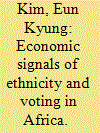

|
|
|
|
|
| Summary/Abstract |
The existing literature has demonstrated that both ethnic and economic factors affect a vote decision in African democracies. I show that there is a meaningful interaction between the two cleavages in their influence on voting. In particular, I argue for political salience of agricultural subsectors that shape the electoral consequences of economic performance in the context where agricultural policy affects the livelihood of the majority population. Relying on the analyses of the 2007 and 2013 elections in Kenya, I illustrate how likely an individual, who is attached to a politically coherent ethnic group, votes for a candidate, the majority of whose ethnic members engage in the same industry as the voter himself regardless of the candidate's ethnicity. The results show that the sector factor reinforces the positive and negative effects of ethnic communities on incumbent support, and also explains voting by ethnic minorities whose motives for voting are not ethnic.
|
|
|
|
|
|
|
|
|
|
|
|
|
|
|
|
| 6 |
ID:
100585
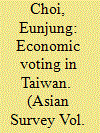

|
|
|
|
|
| Publication |
2010.
|
| Summary/Abstract |
An analysis of the 1996 and 2004 Taiwan presidential elections demonstrates that the voters' overall economic experiences under the dominant Kuomintang and level of education mediated the effect of short-term economic conditions on individual vote choice before and after the first power transition.
|
|
|
|
|
|
|
|
|
|
|
|
|
|
|
|
| 7 |
ID:
146073
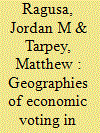

|
|
|
|
|
| Summary/Abstract |
JORDAN M. RAGUSA and MATTHEW TARPEY look at whether local economic conditions affect voting behavior in the United States. They argue that economic voting is principally a national phenomenon, with variation in the national unemployment rate having robust effects in both presidential and congressional elections.
|
|
|
|
|
|
|
|
|
|
|
|
|
|
|
|
| 8 |
ID:
111172


|
|
|
|
|
| Publication |
2012.
|
| Summary/Abstract |
A voter's capacity to acquire and retain information moderates the relationship between issues and the vote. Issues differ in their distance from the voter's personal experience. Proximate issues, such as personal economic conditions, affect the vote decisions of highly informed and less informed voters equally. Distant issues, such as national economic conditions and foreign affairs, affect the vote of highly informed voters but not less informed voters. The 2008 presidential election on Taiwan provides a critical test of the effect of information on issue voting. Unification with mainland China versus Taiwan independence is the most important issue in the 2008 election, and voters with higher levels of political information show a larger effect of the issue on their vote. The national economy is also a significant predictor of vote choice, but only for highly informed voters. Personal economic conditions and other proximate issues are not significant predictors of the vote at any information level.
|
|
|
|
|
|
|
|
|
|
|
|
|
|
|
|
| 9 |
ID:
078406
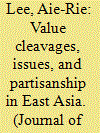

|
|
|
|
|
| Publication |
2007.
|
| Summary/Abstract |
This article examines how the social transformation in many East Asian democracies is altering the value priorities of their publics, and how these values are affecting party choice. Our analyses are based on the newest wave of the World Values Survey. We find that the emergence of an authoritarian-libertarian value cleavage is clearly associated with level of development, but these values emerge well before what prior research indicated. In addition, we show that party loyalty among the East Asian citizenry is shaped by a mix of social values, economic issues, left-right ideology, distrust in governmental institutions, and proclivities to engage in protest activities.
|
|
|
|
|
|
|
|
|
|
|
|
|
|
|
|
| 10 |
ID:
151663
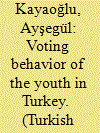

|
|
|
|
|
| Summary/Abstract |
The decline of conventional political participation of the youth is a serious concern in many countries worldwide. Studying the Turkish example, this paper aims to empirically analyze the determinants of youngsters’ (non)voting behavior. The analysis shows that lifestyle is the most important factor, reflecting the importance of the youth’s everyday practices on their conventional political participation. Besides, being female, having higher levels of education and residing in an urban area increase the probability of abstaining. Moreover, ‘economic voting’ exists for youngsters as they are found to be punishing the ruling Justice and Development Party (AKP) for economic prospects unpromising either individually or societally. For first-time voters, lifestyle and the 2013 Gezi protests are the main determinants of voting behavior. Furthermore, there is persistence in abstaining from voting as having abstained in the 2011 general elections increases the probability of abstaining again by 18 percent. The analysis of disillusioned youth demonstrates that Gezi protests have increased the probability of their conventional political participation; they can be associated either with a decline in their probability of voting for the AKP, or of being indecisive and/or abstaining. A factor change analysis, however, finds that the abstained and indecisive Kurdish youth’s preferences have shifted towards pro-Kurdish Peace and Democracy Party post-Gezi.
|
|
|
|
|
|
|
|
|
|
|
|
|
|
|
|
| 11 |
ID:
120135


|
|
|
|
|
| Publication |
2013.
|
| Summary/Abstract |
Voters who perceive the economy to be weak are generally less likely to support the incumbent government. Yet there is a debate over whether all people respond equally to economic shifts or if the state of the economy is more salient for those who feel economically vulnerable. This article examines whether insecure employment situations and employability concerns strengthen responses to the government's economic record. Data from Latin America and Eastern Europe confirm that workers who feel anxious about being fired or who believe it would be difficult to find a new job place significantly greater weight on sociotropic evaluations than do those with more secure employment situations. Thus incumbents who create risks for vulnerable workers are sanctioned, while those who create opportunities are rewarded most.
|
|
|
|
|
|
|
|
|
|
|
|
|
|
|
|
|
|
|
|
|